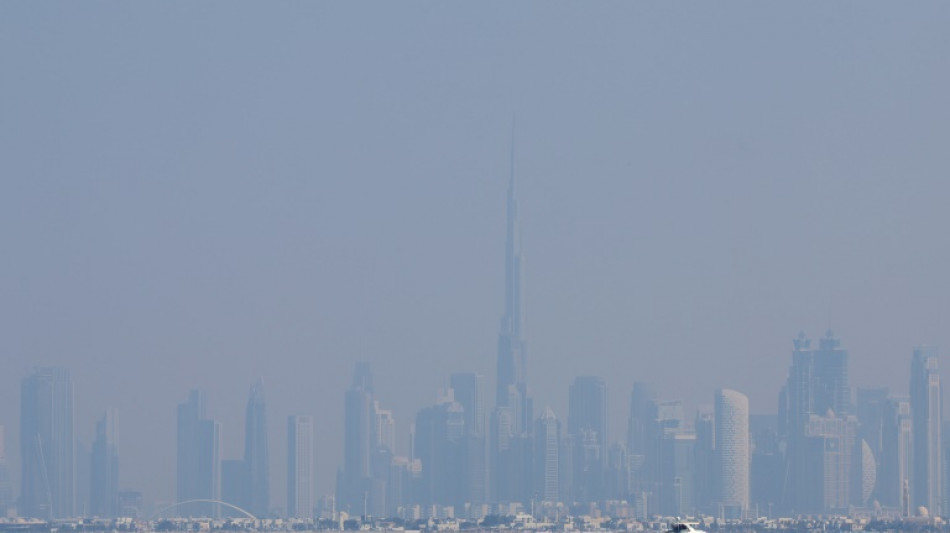
-
 Bangladesh says at least 287 killed during Hasina-era abductions
Bangladesh says at least 287 killed during Hasina-era abductions
-
South Korea's Lee meets Xi with trade, Pyongyang on the agenda

-
 Gauff shocked in United Cup, comeback kid Hurkacz stuns Zverev
Gauff shocked in United Cup, comeback kid Hurkacz stuns Zverev
-
Tech firms lead markets higher, oil swings after Maduro ouster

-
 Defending Brisbane champion Lehecka wins tough opener
Defending Brisbane champion Lehecka wins tough opener
-
Maduro's fall tests Venezuela's ruling 'club'

-
 'I can't walk anymore': Afghans freeze to death on route to Iran
'I can't walk anymore': Afghans freeze to death on route to Iran
-
UK starts ban on junk food ads on daytime TV and online

-
 Trump declares US 'in charge' of Venezuela and Maduro goes to court
Trump declares US 'in charge' of Venezuela and Maduro goes to court
-
Two killed in series of Russian attacks on Ukraine

-
 Kasatkina feels pressure to 'repay Australia' after Russia switch
Kasatkina feels pressure to 'repay Australia' after Russia switch
-
Suns stun NBA-best Thunder as East-leading Pistons top Cavs

-
 China's birth-rate push sputters as couples stay child-free
China's birth-rate push sputters as couples stay child-free
-
'Not about condoms': Chinese shrug off contraceptive tax

-
 Root's majestic 160 powers England to 384 in final Ashes Test
Root's majestic 160 powers England to 384 in final Ashes Test
-
Chalamet boosts Oscar bid with Critics Choice Awards win

-
 'Tuna King' pays record $3.2 mn for bluefin at Tokyo auction
'Tuna King' pays record $3.2 mn for bluefin at Tokyo auction
-
Tech firms lead Asian markets higher, oil swings after Maduro ouster

-
 Cricket Australia boss hits out at 'archaic' bad light rules
Cricket Australia boss hits out at 'archaic' bad light rules
-
Trump insists 'we need Greenland'

-
 Century-maker Root steers England to 336-6 in final Ashes Test
Century-maker Root steers England to 336-6 in final Ashes Test
-
'Free our president', Maduro supporters demand at rally

-
 Danish PM calls on US to stop 'threatening' Greenland
Danish PM calls on US to stop 'threatening' Greenland
-
North Korea tests hypersonic missiles, says nuclear forces ready for war

-
 Root in Ponting territory with 41st Test century at 5th Ashes Test
Root in Ponting territory with 41st Test century at 5th Ashes Test
-
Guan Huat Seng Holdings Berhad Launches IPO Prospectus To Drive Next Phase Of Growth

-
 Apex Receives Exploration Permit for Rift REE Project, Nebraska; Drill Program Preparation Underway
Apex Receives Exploration Permit for Rift REE Project, Nebraska; Drill Program Preparation Underway
-
South Korea's Lee to meet Xi with trade, Pyongyang on the agenda

-
 Messi's Miami sign Canada goalkeeper St. Clair
Messi's Miami sign Canada goalkeeper St. Clair
-
Pistons top Cavs as Pacers' NBA misery continues

-
 Gonzalo treble helps Real Madrid thrash Betis, Atletico hopes dented
Gonzalo treble helps Real Madrid thrash Betis, Atletico hopes dented
-
Djokovic quits players' union he co-founded

-
 Anne Frank's step-sister, Holocaust survivor Eva Schloss dies
Anne Frank's step-sister, Holocaust survivor Eva Schloss dies
-
France's Le Garrec inspires La Rochelle to Toulon rout

-
 Hosts Morocco reach AFCON quarter-finals as Cameroon knock out South Africa
Hosts Morocco reach AFCON quarter-finals as Cameroon knock out South Africa
-
Inter Milan reclaim Serie A summit

-
 Atletico title hopes dented in Real Sociedad draw
Atletico title hopes dented in Real Sociedad draw
-
Doue, Dembele light up first Paris derby in over 35 years

-
 Swiss grieve as all fire victims identified -- half of them under 18
Swiss grieve as all fire victims identified -- half of them under 18
-
Panthers advance to NFL playoffs after Falcons beat Saints

-
 Cameroon end South Africa hopes to reach AFCON last eight
Cameroon end South Africa hopes to reach AFCON last eight
-
'A gift' to be back, says Rodri despite Man City stumble

-
 Colombian guerrillas vow to confront US 'imperialism'
Colombian guerrillas vow to confront US 'imperialism'
-
Morocco lose injured playmaker Ounahi for rest of AFCON bid

-
 Trump threatens new Venezuela leader after raid to seize Maduro
Trump threatens new Venezuela leader after raid to seize Maduro
-
Man City title hopes hit by managerless Chelsea

-
 Man City held by Chelsea in major title blow, Liverpool denied in Fulham thriller
Man City held by Chelsea in major title blow, Liverpool denied in Fulham thriller
-
Managerless Chelsea dent Man City title hopes

-
 Ekitike's absence in Fulham draw leaves Slot with threadbare options
Ekitike's absence in Fulham draw leaves Slot with threadbare options
-
Delcy Rodriguez: From Maduro's 'tigress' to acting Venezuelan president


Climate deal won't have immediate impact on Gulf oil
An agreement to "transition away" from fossil fuels may be a landmark moment but don't expect quick changes among the major producers of the Gulf, where the deal was hammered out.
After the UN's COP28 climate talks in Dubai, Saudi Energy Minister Prince Abdulaziz bin Salman immediately played down the text, insisting it would have "no impact on exports" from the country that ships more oil than any other.
The deal "doesn't impose anything" on oil-producing countries and allows them to cut emissions "according to their means and their interests", the minister said.
It is not an "agreement on the immediate or progressive elimination of fossil fuels, but a process of transition", he told Saudi TV channel Al Arabiya Business on Wednesday.
The prince had earlier voiced staunch opposition to including a phasing-down of fossil fuels in the Dubai text, which ultimately omitted any mention of "phase-down" or "phase-out".
Striking a deal that appeases nearly 200 countries -- even though some critics were not in the room when it was passed -- followed some deft deal-making by the COP28 presidency.
The United Arab Emirates' official WAM news agency called it a "win-win for all", describing COP28 as a "watershed moment in the fight against climate change".
For French Energy Minister Agnes Pannier-Runacher, it was also an exercise in realpolitik.
The deal's phrasing was "a very elegant way by the different negotiators to find a way out for all parties... nobody loses face and it's the climate and the planet that win".
- 'Producing oil for decades' -
Saudi Arabia and the UAE are investing in renewable energy and have pledged to decarbonise their domestic economies -- not including the fossil fuels they sell abroad.
They are also, like other oil producers including the United States, building up their capacities to cater for an expected rise in demand.
However, the realities of a post-oil future and the economic opportunities of the energy transition are not lost on the Gulf monarchies, analysts say.
"They'll keep producing and exporting oil for decades," Ben Cahill, senior fellow at the Center for Strategic and International Studies' Energy Security and Climate Change Program, told AFP.
"But the UAE is also investing to create a more diversified energy system and sees itself as a global player in financing the energy transition."
Andreas Krieg, a political risk analyst specialising in the Middle East, said it was a "significant and trend-setting statement" as it was agreed in the UAE under a COP28 president, Sultan Al Jaber, who is CEO of oil giant ADNOC.
"I think this is a shift in narrative for the hydrocarbon rentier states of the Gulf, who understand that the intent of phasing out fossil fuels will be reality-checked by a fairly stable demand for oil and certainly gas in the coming decades outside of the developed world," he said.
- 'Million-dollar question' -
How Saudi Arabia was brought on board is the "million-dollar question" said Cinzia Bianco, a visiting follow at the European Council on Foreign Relations.
"The UAE benefit from the production of fossil fuels, but they have already embraced that transition, way before the other producers," she said.
"It was easier for them than it was for the Saudis, who have still not embraced it to the same extent, to be the shepherd of a compromise position."
Krieg said the Saudi opposition "has to be seen in the light of growing intra-Gulf competition and was an attempt to undermine the prospect of COP28 becoming successful.
"However, considering that the global consensus was so strong and overwhelming, Saudi did not want to be seen as the odd-one out."
For the UAE, COP28 was not just about environmental benefits, said Kristian Ulrichsen, fellow for the Middle East at the Baker Institute in Houston, Texas.
"The UAE invested a lot of political and diplomatic capital in COP28 and wanted precisely this kind of landmark statement that would associate the UAE with setting the global agenda and forging a new consensus for the road ahead," he said.
J.Oliveira--AMWN

